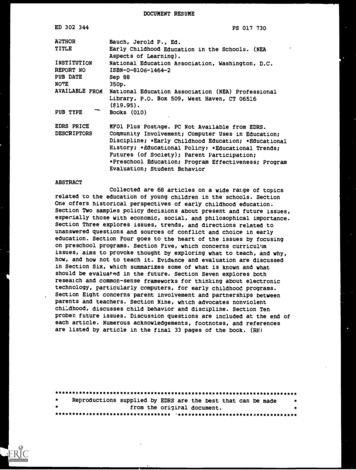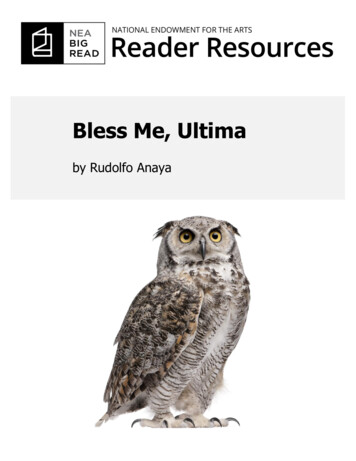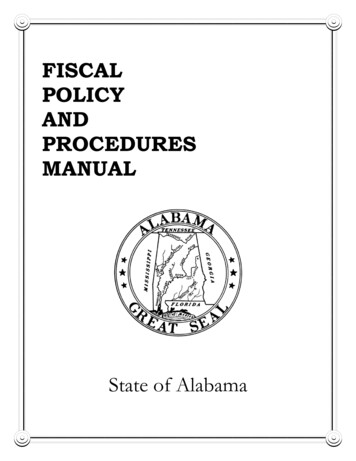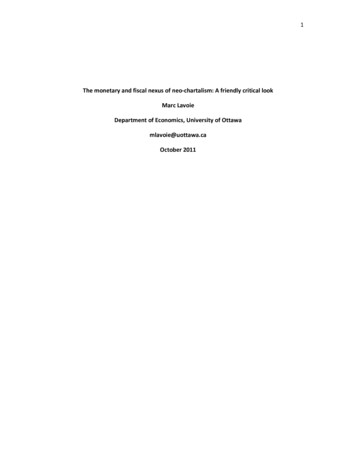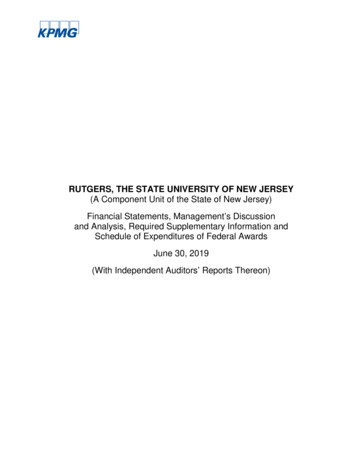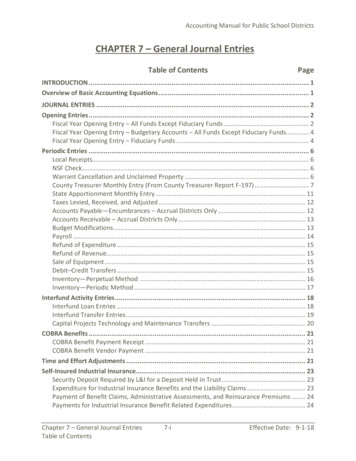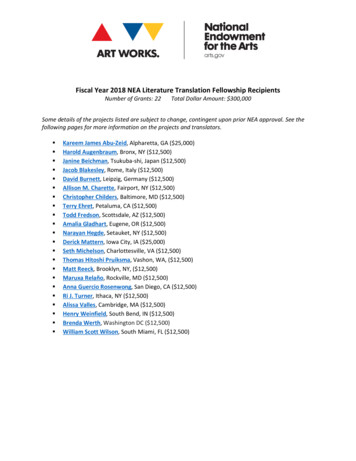
Transcription
Fiscal Year 2018 NEA Literature Translation Fellowship RecipientsNumber of Grants: 22Total Dollar Amount: 300,000Some details of the projects listed are subject to change, contingent upon prior NEA approval. See thefollowing pages for more information on the projects and translators. Kareem James Abu-Zeid, Alpharetta, GA ( 25,000)Harold Augenbraum, Bronx, NY ( 12,500)Janine Beichman, Tsukuba-shi, Japan ( 12,500)Jacob Blakesley, Rome, Italy ( 12,500)David Burnett, Leipzig, Germany ( 12,500)Allison M. Charette, Fairport, NY ( 12,500)Christopher Childers, Baltimore, MD ( 12,500)Terry Ehret, Petaluma, CA ( 12,500)Todd Fredson, Scottsdale, AZ ( 12,500)Amalia Gladhart, Eugene, OR ( 12,500)Narayan Hegde, Setauket, NY ( 12,500)Derick Mattern, Iowa City, IA ( 25,000)Seth Michelson, Charlottesville, VA ( 12,500)Thomas Hitoshi Pruiksma, Vashon, WA, ( 12,500)Matt Reeck, Brooklyn, NY, ( 12,500)Maruxa Relaño, Rockville, MD ( 12,500)Anna Guercio Rosenwong, San Diego, CA ( 12,500)Ri J. Turner, Ithaca, NY ( 12,500)Alissa Valles, Cambridge, MA ( 12,500)Henry Weinfield, South Bend, IN ( 12,500)Brenda Werth, Washington DC ( 12,500)William Scott Wilson, South Miami, FL ( 12,500)
Credit: PEN Center USAKareem James Abu-Zeid, Alpharetta, GA ( 25,000)To support the retranslation from the Arabic of Hanging Poems: The Classic Works of Pre-Islamic ArabicPoetry by various authors. This collection of ten long poems is considered the foundation of all Arabicpoetry and the beginning of Arabic literature as a whole, as important and as popular as Beowulf inEnglish. The poets lived in or around the Arabian Peninsula in the 6th and 7th centuries C.E., during atime of tribal warfare and nomadic lifestyles. Amid the poems' vivid details of the harsh desertlandscape are universal themes of love, death, war, hubris, and the impermanence of existence. Unlikemuch older translations of this work, this new translation will be more poetic and accessible. Each poemwill be contextualized with a brief introduction.Kareem James Abu-Zeid is an Egyptian-American translator of poets and novelists from across the Arabworld. His most recent book-length translations include Najwan Darwish's Nothing More to Lose, DunyaMikhail's The Iraqi Nights, and Rabee Jaber's Confessions and The Mehlis Report. He has received PENCenter USA's 2017 translation prize, Poetry Magazine's 2014 translation prize, a Fulbright researchfellowship, and translation residencies from the Lannan Foundation and the Banff International Centerfor the Arts, among other honors. In 2016, he completed his PhD in Comparative Literature at UCBerkeley.Page 2 of 23
Credit: Leslie ShipmanHarold Augenbraum, Bronx, NY ( 12,500)To support the translation of Pedro Alejandro Paterno's Ninay, the first novel from the Philippines,published in Spanish. Paterno (1857-1911) was among the first Filipino authors to write in the coloniallanguage, and was part of a group of young Filipino expatriates in Madrid known as "ilustrados" who setout through their work to display the cultural history of the Philippines, which both secular and religiousSpanish colonizers denied before the late-19th century. Ninay centers on a young Filipino man in the19th century who has lived abroad for most of his life but has returned home. While home he visitshouses afflicted by cholera during the epidemic in Manila and begins to discover his culture. The novel issprinkled with flora, fauna, and place-names that Paterno explains in extensive footnotes.Harold Augenbraum is an American writer, editor, and translator. He is currently acting editor of TheYale Review. Previously he was executive director of the National Book Foundation, a member of theBoard of Trustees of the Asian American Writers Workshop, and vice chair of the New York Council forthe Humanities. Augenbraum has published six books on Latino literature and translations of ÁlvarNúñez Cabeza de Vaca’s Chronicle of the Narvaez Expedition and the Filipino novelist Jose Rizal's Noli MeTangere and El filibusterismo for Penguin Classics.Page 3 of 23
Credit: Takeo YamamotoJanine Beichman, Tsukuba-shi, Japan ( 12,500)To support the translation from the Japanese of the selected poems of Yosano Akiko (1878-1942).Although little known outside of Japan, Akiko is considered one of the giants of pre-war modernJapanese literature. Her oeuvre includes more than 20 volumes of poetry, as well as essays, criticism,memoirs, children's stories, plays, and translations of classical Japanese literature into modernJapanese. The mother of 13 children, Akiko is known for her exploration of such themes as love, beauty,freedom, and the natural world. This volume will showcase her poetics and personal developmentthrough several hundred of her best poems, both free verse and the 31-syllable tanka. The aim of theproject is to put Yosano Akiko where she belongs: on the map of world poetry in the 20th century.Janine Beichman received her doctorate from Columbia University, specializing in Japanese poetry. Herpublications include biographies of Masaoka Shiki and Yosano Akiko, a translation of Ōoka Makoto'santhology of Japanese poetry and a volume of Ōoka's own poems, as well as her original Noh playDrifting Fires.Page 4 of 23
Credit: University of LeedsJacob Blakesley, Rome, Italy ( 12,500)To support the translation from the Italian of Mikrokosmos, an anthology of poems by neo-avant-gardepoet Edoardo Sanguineti. Sanguineti (1930-2010) was a cultural journalist; a dramatist and librettist; anacclaimed and idiosyncratic translator of Greek comedy, classical tragedy, and Shakespeare; anexperimental novelist of repute; a professor of Italian literature; and (briefly) a politician.Mikrokosmos—the last major collection of poetry he published in Italy—includes poems he selectedfrom his previous 26 volumes written over the course of his career. The 336-page collection is dividedinto two parts: the poems in the first part are chronological, showing the variations in poetics over theyears; the second part shows his range of style, including musical ballads, ekphrastic poems, haikus, andpolitical verse.Jacob D. Blakesley is a University Academic Fellow in World Literatures at the University of Leeds. Hereceived his PhD in Italian from the University of Chicago in 2011. He has published widely on poetrytranslation, including his 2014 monograph, Modern Italian Poets: Translators of the Impossible(University of Toronto Press). He has translated a variety of Italian poets, including Maria Borio, FrancoBuffoni, Ernesto Livorni, Sandro Penna, Salvatore Quasimodo, Amelia Rosselli, and Andrea Zanzotto.Page 5 of 23
Credit: Dan ZulaDavid Burnett, Leipzig, Germany ( 12,500)To support the translation from the German of the novel Angelic Tongues by Bulgarian-born DimitréDinev. Dinev (b. 1968 in Plovdiv) fled Bulgaria after the collapse of communism in the winter of 1990,entering Austria illegally via Czechoslovakia. In 1992, he began writing plays, screenplays, and prose inGerman. In 2005, he was awarded the Adelbert von Chamisso Prize for non-native German speakerswriting literary works in German. First published in 2003 to unanimous critical praise, his novel AngelicTongues tells the tale of the rise and fall of two families in communist Bulgaria, a kind of Balkan blues byturns comic and tragic. Set mostly in 1960s and 1970s Plovdiv, it begins and ends in modern-day Vienna,where the scions of these ruined families—two 30-something Bulgarians both stranded in the Austriancapital and desperate for a miracle—meet by chance in the Central Cemetery, at the graveside of aSerbian gangster now rumored to be a guardian angel and protector of struggling immigrants. This fastpaced, playful, lyrical work brings to life a magical world from the darkness of recent history.David Burnett is a native of Northeast Ohio and now lives in Leipzig, Germany, where he works as afreelance translator with a focus on history and literature. His first book-length literary translation wasthe East German novel New Glory by Günter de Bruyn, published in 2009 by Northwestern UniversityPress. His translation of Daniel Siemen's The Making of a Nazi Hero: The Murder and Myth of HorstWessel was chosen as a BBC History Magazine Book of the Year in 2013. In 2014, he received aPEN/Heim Translation Fund Grant for the stories of Bohemian-born Johannes Urzidil, a selection ofwhich were published by Pushkin Press in 2017 under the title The Last Bell.Page 6 of 23
Allison M. Charette, Fairport, NY ( 12,500)To support the translation from the French of the novel Lalana by Malagasy author Michèle Rakotoson.Rakotoson (b. 1948) is one of the most successful authors in Madagascar with an oeuvre of dozens ofnovels, short stories, memoirs, plays, and children's literature, as well as a track record of championingthe next generation of Malagasy writers through readings, salons, conferences, and publishingassistance. Compared with the rest of the Francophone world, literature from Madagascar isunderrepresented in English translation; the first ever English translation of a novel by a Malagasyauthor is scheduled to be published in 2017. Lalana tells the story of a young man dying of AIDS in theslums of the capital city who is so desperate to see the ocean for the first time that his friend borrows acar, springs him from the hospital, and drives him east into the country where they encounter a cast ofcharacters trying to reconcile old beliefs and traditions with a contemporary world.Allison Charette is a translator and writer whose work has been published by Restless Books, the NewYork Times, Words Without Borders, The Other Stories, SLICE, and others. Her translations have alsobeen used as supertitles in various venues, including Carnegie Hall. Charette founded the EmergingLiterary Translators' Network in America (ELTNA) and currently advises the Emerging TranslatorMentorship program at the American Literary Translators Association (ALTA).Page 7 of 23
Credit: Songmuang GreerChristopher Childers, Baltimore, MD ( 12,500)To support the retranslation of Latin and Greek lyric poetry from the 7th century B.C.E. to the 1stcentury C.E. in one comprehensive anthology. Featuring between 25 and 50 poets from Archilochus toMartial—including well-known classical poets such as Sappho, Ovid, and Horace—this 448-pageanthology of lyric poetry will offer a multiplicity of voices and personalities from the ancientMediterranean, translated using the full resources of traditional English prosody. While there are manyother English versions of classical Latin and Greek lyric poetry, there are few that combine bothlanguages, and fewer still of comparable poetic ambition and scope. This project aims to add significanthistorical, cultural, and literary context to provide a fuller picture of the art and people who made it. Thebook will be separated into three parts: Archaic, Classical and Hellenistic, and Roman Lyric.Christopher Childers's poems, essays, and translations have appeared in The Yale Review, The KenyonReview, Parnassus, and elsewhere. He lives in Baltimore, Maryland, and teaches at Johns HopkinsUniversity.Page 8 of 23
Credit: M. A. RasmussenTerry Ehret (in collaboration with John Johnson and Nancy J. Morales), Petaluma, CA ( 12,500)To support the translation from the Spanish of the poetry collection Plagios by Uruguayan-Mexicanwriter Ulalume Gonzalez de Leon. Gonzalez de Leon (1928-2009) was born in Uruguay and became anaturalized Mexican citizen in 1948. She was an award-winning poet, essayist, and translator whosework regularly appeared in journals beside the work of Jorge Luis Borges, Samuel Beckett, MilanKundera, and Czeslaw Milosz, and yet, her work is relatively unknown in the English-speaking world. Inthe 1960s and '70s, she was among a generation of Latin American writers experimenting with languageand challenging the traditional identities of women. Nobel Laureate Octavio Paz, who provides aprologue to this collection, called her "the best Mexican poet since Juana Ines de la Cruz." Plagios is acompilation of 158 poems from six collections published between 1968 and 1979.Terry Ehret is one of the founders of Sixteen Rivers Press. Literary honors for her previous collections,Lost Body, Translations from the Human Language, and Lucky Break, include the National Poetry Series,the Commonwealth Club of California Book Award, the Nimrod/Hardman Pablo Neruda Poetry Prize,and a Northern California Book Award nomination. Her most recent collection is Night Sky Journey,published by Kelly's Cove Press. She has taught writing at San Francisco State and Sonoma StateUniversities, California College of the Arts, Santa Rosa Junior College, and with the California Poets in theSchools Program.Page 9 of 23
Credit: Lee HarmonTodd Fredson, Scottsdale, AZ ( 12,500)To support the translation from the French of the poetry collection The future has an appointment withthe dawn by Ivorian writer Tanella Boni. Boni (b. 1954) is one of the most prominent poets, novelists,essayists, and philosophers of francophone Africa, and yet, only a handful of her poems are available inEnglish. Published in 2011 and characterized by its spare lyricism, the 86-page collection is divided intotwo sections: "Land of Hope" and "The Assassinated Life." The collection reckons with the Ivory Coast'srupture as ethnic violence and civil war overwhelmed daily life in the country through the first decade ofthe new millennium.Todd Fredson is a poet, scholar, and translator of Afro-francophone and West African literature. He hasmade French to English translations of two books by Ivorian poet Josue Guebo: Think of Lampedusa andMy country, tonight. Fredson is currently working with Azo Vauguy to translate from French and Bété toEnglish Vauguy's book-length poem, Zakwato, which is an adaptation of a myth from the Bété ethnicgroup in the Ivory Coast. Fredson was a 2015-16 Fulbright Fellow to the Ivory Coast. The future has anappointment with the dawn will be published by the University of Nebraska as part of its African PoetryBook Series.Page 10 of 23
Credit: Sarah GrewAmalia Gladhart, Eugene, OR ( 12,500)To support the translation from the Spanish of the novel Jaguars' Tomb by Argentine writer AngélicaGorodischer. The author of 30 novels, short story collections, and essays, Gorodischer (b. 1928) is knownfor her science fiction, fantasy, crime, and feminist writing. She is the recipient of numerous nationaland international awards, including the World Fantasy Award for Lifetime Achievement previously wonby such writers as Ray Bradbury, Ursula K. Le Guin, and Stephen King. Published in 2005, Jaguars' Tombis a 218-page novel of three distinct parts that addresses the difficulty of representing absence,including those absences left by the abductions and disappearances that occurred during the militarydictatorship in Argentina's "Dirty War" of 1976-83. Each of the sections repeats images from the othersand circles a central space that, though it serves different functions in each section, always has a senseof loss at its center.Amalia Gladhart is a translator and professor of Spanish at the University of Oregon. She has writtenwidely on contemporary Latin American literature and performance. Her translations include ThePotbellied Virgin and Beyond the Islands, both by Alicia Yánez Cossío; and Trafalgar, by AngélicaGorodischer. Her collection of prose poems, Detours, was published by Burnside Review Press. Her shortfiction appears in Saranac Review, The Fantasist, Atticus Review, Eleven Eleven, and elsewhere.Page 11 of 23
Credit: Rita HegdeNarayan Hegde, Setauket, NY ( 12,500)To support the retranslation from the Kannada of the novel Avasthe by Indian writer U. R.Ananthamurthy. Kannada is a major language of India, spoken by roughly 60 million people in the stateof Karnataka. Ananthamurthy (1932-2014) is one of the most celebrated writers of contemporary India.He was one of the pioneers of the Navya (Modernist) movement in Kannada literature. His publishedwork includes four novels, several short story collections, collections of poems, books of essays, and aplay. He was the President of the Sahitya Akademi (the Indian National Academy of Letters), theChairman of the National Book Trust, and the Vice-Chancellor of Mahatma Gandhi University. He is arecipient of numerous awards, including the Jnanpith Award, India's highest literary honor. He wasnominated as one of the finalists for the 2013 Man Booker International Prize for Fiction. His recentpassing caused a wave of grief across Karnataka where he received a full state funeral covered by majormedia. First published in 1978 and made into a feature film in India, Avasthe is the third novel in atrilogy that chronicles the social and political changes in India immediately after the country'sindependence from colonial rule. While the other two books in the trilogy are available in Englishtranslations, Avasthe remains virtually unknown outside southern India.Narayan Hegde is Emeritus Professor of English at SUNY College at Old Westbury, where he taughtEnglish, Indian, and World Literatures. As a Senior Fellow of the American Institute of Indian Studies, hehas translated several works of Kannada literature, including Stallion of the Sun and Other Stories by U.R. Ananthamurthy, Annayya's Anthropology by A. K. Ramanujan, and a 19th-century drama, TheMarriage Farce of Iggappa Hegade. He is a recipient of the Katha Translation Award. He is currently partof a team translating the 15th century Kannada epic Kumaravyasa Bharatha for publication by HarvardUniversity Press in its Murty Classical Library of India series.Page 12 of 23
Credit: Derick MatternDerick Mattern, Iowa City, IA ( 25,000)To support the translation from the Turkish of the selected poems of Haydar Ergülen. Ergülen (b. 1956)is one of the most prominent poets of modern Turkey, respected for his prolific output of poems andliterary criticism, as well as his many distinguished awards. His books maintain a steady popular appeal,enjoying multiple print runs and sales by the thousands. Through his subjects and references, his workoften acts as an intimate primer to Turkish writers past and present, as well as to the mysticism of hisAlevi heritage. His lyric voice traces the delights of love and authenticity, often going back to a nostalgicchildhood when Turkey's diverse communities lived in relative harmony, only to return to the present toelegize the lost. Curated from poems that span his 40-year oeuvre, this 120-page collection will includemore than 100 poems, as well as 30 pages of critical analysis.Derick Mattern will soon graduate from the Iowa Translation Workshop, where he is an Iowa ArtsFellow. His translations of Ergülen's poems have appeared or are forthcoming in Asymptote, ModernPoetry in Translation, World Literature Today, and many others. He holds an MFA in poetry from theUniversity of Wisconsin-Madison and his poems have appeared in Subtropics, The Los AngelesReview, The Adroit Journal, and elsewhere. He lived and taught in Istanbul from 2008 to 2013.Page 13 of 23
Credit: Vicki ContiSeth Michelson, Charlottesville, VA ( 12,500)To support the translation from the Spanish and the Mapuzungun of two poetry collections byMapuche-Argentine poet Liliana Ancalao. A member of the Mapuche-Tehuelche Nankulavencommunity, Ancalao (b. 1961) was born in the Patagonian province of Chubut in southern Argentina, anarea where nomadic indigenous Tehuelche peoples lived for thousands of years before the arrival ofEuropeans in the early sixteenth century. This collection will combine into a single volume ampleselections from two of Ancalao's works: Women in the Open Air (2001) and Fabric with Raw Wool(2009), and will be published trilingually, in Mapuzungun, Spanish, and English. It also will comprise thefirst single-author volume of poetry by a female Mapuche poet from Argentina in English-languagetranslation, and only the second ever such single-author collection by a female Mapuche poet. Ancalaowrites within a traditional Mapuche framework, honoring the materiality of the Earth as sacred and therights of people to live free of discrimination.Seth Michelson teaches the poetry of the Americas in the Romance Languages Department ofWashington and Lee University. An award-winning poet, translator, and professor, his most recentcollections of original poetry are Swimming Through Fire (2017) and Eyes Like Broken Windows (2012).His most recent books of poetry in translation include Scripted in the Streams (2017) by the Indian poetRati Saxena and Poems from the Disaster (2016) by the Argentine poet Zulema Moret. In early 2018 hewill see published his translations of the books of poetry The Red Song by the Uruguayan poet MelisaMachado; Wings by the Israeli poet Amir Or; and The Ghetto of My Tongue by the Argentine poetTamara Kamenszain.Page 14 of 23
Credit: Sandra ChowThomas Hitoshi Pruiksma, Vashon, WA, ( 12,500)To support the retranslation from the Tamil of Tiruvalluvar's book of poetry, Tirukkural, written between100 B.C.E. and 400 C.E. and known as one of the greatest works in all of Tamil literature. Although itsauthor was neither a mystic nor given to metaphysical speculation, Hindus, Jains, Buddhists, andChristians have all found reasons to claim Tiruvalluvar as their own. His work is an astonishingcompendium of insights on the most essential elements of life—from goodness and marriage toeconomy and politics—composed in vivid and playful poems of less than two lines each, and arrangedinto three sections and 133 chapters according to the goals of Hindu tradition believed to lead toliberation and release: virtue, wealth, and love. There have been other English translations of this worldclassic, but of them only one was carried out by a native English speaker attempting to translate thepoems as poems and not merely as vessels for ideas—and his version has long been outdated. Thisproject seeks to showcase the literary excellence of the work by rendering afresh the unforgettablehumanity, vitality, and wisdom of Tiruvalluvar’s verse.Thomas Hitoshi Pruiksma is a writer, poet, and translator. His books include Give, Eat, and Live: Poems ofAvvaiyar, Body and Earth: Notes from a Conversation, produced in collaboration with the artist C.F. John,and A Feast for the Tongue: Forty Servings of Spoken Tamil with Helpings of Equally Spoken English, coauthored with Dr. K.V. Ramakoti.Page 15 of 23
Credit: Jane YiMatt Reeck, Brooklyn, NY, ( 12, 500)To support the translation from the Urdu of the novel The Chronicle by Pakistani author Intizar Husain. Aprofessional journalist, Husain (1923-2016) wrote more than 40 books, including novels, short stories,novellas, poetry, and one travelogue, all of which earned him numerous awards, including Pakistan'sStar of Excellence. Newsweek Pakistan recognized him as the most important living writer in Pakistan.The Chronicle is the second novel in a trilogy that stems from Husain's experience of migrating toPakistan after the partition of India in 1947 and explores such themes as South Asia's past, the politics ofthe partition, and the contemporary state of Pakistan. This 295-page novel spans more than 100 years ofSouth Asian life, from the Rebellion of 1857 to the presidency of Zia-ul-Haq (who was the 6th Presidentof Pakistan, 1978-88).Matt Reeck has won fellowships from the Fulbright Foundation, the American Institute of Indian Studies,the National Endowment for the Arts, and the PEN-Heim Translation Fund. Bombay Stories (RandomHouse India 2012, Vintage UK and US 2014)—his co-translation with Aftab Ahmad from the Urdu ofSaadat Hasan Manto—was a New York Times editor’s choice in May 2014. Mirages of the Mind (VintageIndia 2015, New Directions 2016)—his co-translation with Aftab Ahmad from the Urdu of MushtaqAhmed Yousufi—was noted by Three Percent as one of the twenty-five best translations of 2016. ClassWarrior—Taoist Style, his translation from the French of Abdelkébir Khatibi, is available Fall 2017 fromWesleyan University Press.Page 16 of 23
Credit: Joanna NogueraMaruxa Relaño, Rockville, MD ( 12,500)To support the translation from the Spanish of the novel 98 Seconds Without Shade by Bolivian authorGiovanna Rivero. Known as the cult author of Bolivian supernatural gothic literature, Rivero (b. 1972) isthe author of eight collections of short stories and four novels that explore the dark side of humanityand the limits of the imagination in a world in flux. Her characters include zombies and vampires, madscientists and deranged psychiatrists, frontier detectives and serial killers. Published in 2014, this novelis an existential bildungsroman seen through the eyes of a teenage girl from a dysfunctional family wholongs for escape. The novel is infused with humor and flair and is written in a deceptively simple style:what at first looks like minimalism builds over time into a full-fledged and emotionally charged personalepic.Maruxa Relaño is a Spanish-American journalist and translator. During her career, she has translated forThe Wall Street Journal and written articles for such publications as the New York Daily News, Newsday,and New York Magazine. Her published co-translations include the novels Blood Crime by SebastiàAlzamora, War, So Much War by Mercè Rodoreda, The Sea by Blai Bonet, and A Man of His Word byImma Monso.Page 17 of 23
Credit: Jesse Chan NorrisAnna Guercio Rosenwong (in collaboration with María José Giménez), San Diego, CA ( 12,500)To support the translation from the Spanish of the novel The Navel of the Sky by Uruguayan writerRafael Courtoisie. A translator and author of more than 30 novels and books of poetry and essays,Courtoisie (b. 1958) is one of Uruguay's most decorated living authors. He is the recipient of, amongmany other prizes, both the Uruguayan Ministry of Culture's Poetry Award and its Prose Award. Thisnovel was born from the author's visit to La Calera, Chile, where he felt guided through the city by theghost of writer Roberto Bolaño and asked to write a book that blends reality and surreality. The result isa universe populated with beings both imaginary and easily recognized, including Gabriela Mistral, PabloNeruda, and Augusto Pinochet.Anna Rosenwong is a translator, poet, editor, and educator. Her translation of Rocio Ceron'sDiorama won the Best Translated Book Award, and a major collection of Jose Eugenio Sanchez'spoems, Here the Sun's for Real, is forthcoming in March 2018. She has received fellowships from theBanff International Literary Translation Centre and the American Literary Translators Association, and isthe translation editor of Anomaly. Her scholarly and creative work has been featured in such venuesas World Literature Today, The Kenyon Review, and Modern Poetry Today.Page 18 of 23
Credit: Ri J. TurnerRi J. Turner, Ithaca, NY ( 12,500)To support the translation from the Yiddish of selected humoresques by Joseph Tunkel (1881-1949).Tunkel—better known by his pen name Der Tunkeler—was one of the most prolific humorists of modernYiddish literature, yet he has been almost entirely untranslated into English. In his lifetime, he publishedmore than 30 books, including one-act plays, novellas for children, collections of humoresques(humorous monologues and sketches), as well as some 1,500 feuilletons in the Yiddish press. He wasborn in modern-day Belarus, but throughout his adult life moved between Lithuania, Ukraine, New YorkCity, and Poland until he was sent to a concentration camp during World War II, from which he escapedback to New York City. This collection will include approximately 50 of Der Tunkeler's humoresques,which highlight timeless human foibles while offering an unusual perspective on the political, cultural,and literary landscape of his day.Ri J. Turner is a graduate student in Yiddish Literature at the Hebrew University of Jerusalem. She hasalso studied Yiddish language and literature at the Medem Library (Paris Yiddish Center), the WarsawSummer Institute for Yiddish Language and Culture, and the YIVO Institute in New York, and she was a2014 translation fellow at the Yiddish Book Center in Amherst, Massachusetts. She has translated thework of Yiddish writers Malka Locker, Malka Lee, Joseph Tunkel, Fischel Schneersohn, Ida Maze, AaronZeitlin, Chaim Grade, and Aaron Shmuel Tamares, and has published translations in the journals PaknTreger, In Geveb, and others. Her translations of vignettes by Lyala Kaufman were included in the 2016anthology Have I Got a Story for You: More Than a Century of Fiction from the Forward (Ezra Glinter, ed.,New York: W.W. Norton & Co.).Page 19 of 23
Credit: Leonard GardnerAlissa Valles, Cambridge, MA ( 12,500)To support the translation from the Polish of a collection of poems by Zuzanna Ginczanka. Ginczanka(1917-45) was a Polish-Jewish poet who came to critical attention in Warsaw between the wars, and wasarrested and executed in Krakow shortly before the end of World War II. Although she published only asingle collection of poetry, the book On Centaurs created a sensation in Poland's literary circles. Hermost famous poem, Non Omnis Moriar written in captivity in 1942, first published at the initiative ofJulian Przybos, is defiantly addressed to the woman who denounced her to the Gestapo, and was usedas evidence in a post-war court case. Ginczanka is currently being rediscovered by Polish readers, andshe is particularly interesting to English-language readers both as a poet with a powerful lyrical andoften satirical voice that is both feminist and feminine, and as a member of the generation of Jewishwriters that was almost completely destroyed in the Holocaust.Alissa Valles is the author of the poetry collections Orphan Fire and Anastylosis as well as the editor andco-translator of Zbigniew Herbert's Collected Poems 1956–1998, Herbert's Collected Prose 194
To support the retranslation from the Arabic of Hanging Poems: The Classic Works of Pre-Islamic Arabic Poetry by various authors. This collection of ten long poems is considered the foundation of all Arabic poetry and the beginning of Arabic literature as a

